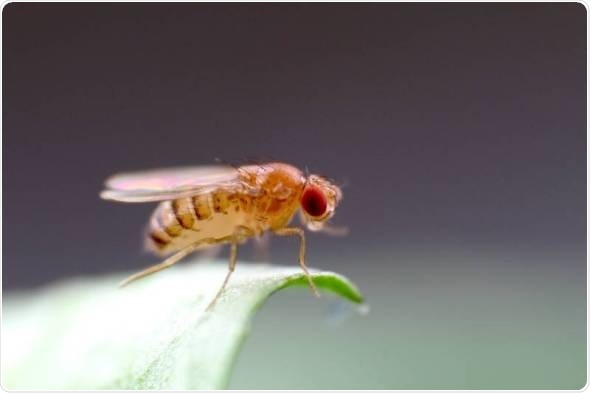Mar 7 2018
Vulnerability in the brain: Individual damaged neuron types cause neurodegenerative diseases
If the sense of smell disappears, this can indicate a disease such as Alzheimer's or Parkinson's disease. However, unlike previously assumed, general degenerations in the nervous system do not play a leading role in the loss of the sense of smell with increasing age, but individual nerve cells or classes of nerves are decisive.

Drosophila melanogaster was investigated for the current study by Prof. Grunwald Kadows' research group on how the odor of animals ages. (Photo: Ariane Böhm / TUM)
Some nerve cells (neurons) or neuron classes in the brain seem to age faster than others. For example, the loss of the sense of smell is one of the first clinical signs of natural aging. This can be accompanied by a neurodegenerative disease such as Alzheimer’s.
"Age is the major risk factor as to why people suffer from Alzheimer's or Parkinson's disease," says Prof. Ilona Grunwald Kadow from the School of Life Sciences at the Technical University of Munich (TUM) - "only a small proportion of these diseases are due to known genetic reasons". The question is why do some neurons age faster than others? Why are some more sensitive? And is the damage to certain types of neurons the reason why whole nerve networks no longer function properly?
A new study conducted under the direction of Prof. Grunwald Kadow (TUM) in collaboration with the groups of Prof. Julien Gagneur (TUM), Prof. Stephan Sigrist (Free University of Berlin) and Prof. Nicolas Gompel (LMU) using the genetic model organism of the fruit fly now shows how the olfactory capacity of these animals ages and how much this resembles the aging process in the human olfactory system. Like humans, the fruit fly loses its powers of smell as it ages. Several key genes and mechanisms were identified that contribute to this aging - associated degeneration.
Which neurons are affected?
In the next step, the scientists examined whether all or only specific neurons of the olfactory circuit are affected. The team found that some neurons are more sensitive than others and decline faster during aging.
They determined that oxidative stress alters primarily specific neuron types, causing the functioning of the entire neural network to gradually collapse. Oxidative stress results in too many reactive oxygen compounds in the cell or tissue, which can cause temporary or permanent damage and accelerated aging.
Interestingly, if the formation of these reactive oxygen compounds in only this type of neurons is prevented, this completely stopped the loss of sense of smell: Old flies sense odors just like their young conspecifics again. This suggests that age-related degeneration could be significantly delayed by preventing oxidative damage in only one or a few neuron types.
But what can reduce oxidative stress in its effect?
A trial with an antioxidant in the form of several weeks of resveratrol administration in younger flies showed that it can counteract oxidative stress, which develops during aging. This treatment appeared to protect the particularly sensitive neurons and thereby contributed to maintaining the function of the neurons connected to them within the neural network. In the elderly, such treatments might help to delay the onset of neurodegenerative diseases associated with aging.
Another possible factor that could play a role in the aging process is the intestinal microbiome. It could be involved in the progression of Parkinson's disease. Grunwald Kadow and her team have therefore also tested the effect of specific microbiota on olfactory aging in fruit flies with the result that certain bacteria have a positive effect and slow down olfactory neurodegeneration.
According to Prof. Grunwald Kadow, these findings and further ongoing experiments in the fruit fly model can help to pave the way for more targeted and new treatments and therapy routes, in which, among other things, drug or microbiota administration would be combined with each other.
Source: https://www.tum.de/en/about-tum/news/press-releases/detail/article/34509/